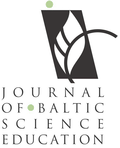| Abstract | Dear readers!
When, ten years ago, together with colleagues from Linköping University we, as part of the Visby project in Sweden, analysed the reasons behind students’ motivation to become science teachers, we took it as almost a surprise that for 75% of those students the reason was that they had always been interested in science. The second most popular answer was - I like working with people/ children. Certainly, evaluating those answers from a time distance, it seems – there was nothing to be so surprised about. Interest is and always has been a driving force for human mind and activities. And, from our personal experience, we know how difficult it is to do a boring job. Though, for adults, their sense of duty also plays a certain role.
But let us bear in mind also how often pupils and adults say – this or that is interesting but is not for me. It seems that today this sentence very often refers to science sphere – there are so many pupils finding this field of great interest but never considering it as their future career. Certainly, not everyone should become a scientist or an engineer, however, a scientifically well-grounded approach to problems, including those of social character, is a quality one can acquire through understanding of the scientific regularities.
This summer several significant scientific events took place in Europe, such as: the 6th IOSTE Symposium for Central and Eastern Europe (Šiauliai, Lithuania), ESERA (European Science Education Research Association) conference in Malmö (Sweden) and others. Pupils’ interest in science, promoting and developing it, even not being the guideline of science didactics right now, is and will always be one of the basic issues for scientists and researchers to focus on. This same issue was discussed also at the above mentioned conferences. The latest research of the ROSE project shows that those pupils who take interest in science themselves and believe that it should be studied by everyone very well understand how school science can form their future careers. They also more often see their future connected with environment protection, which is evidently due to them having more successfully acquired science at school and having better understood the modern environmental problems.
However, raising interest in science is not an easy task in the globalized world of today. There are many things around us so much easier to acquire than good knowledge and solid skills in science subjects! And sometimes we: science teachers and university professors, take an approach that is too academic as, during our school years, profound academic knowledge or even science for science seemed the very peak of the teaching/learning process. And we found that interesting – it was our future!
This is why today, when the latest issue of Journal of Baltic Science Education is published, this event, in our region, coinciding symbolically with the beginning of a new academic year in universities and schools of all levels, I would like to wish every science teacher and natural science researcher – do not lose the enthusiasm about science you possessed as pupils, develop it, and, creatively changed, pass it on to your students and pupils!
Science for science, but, first of all – science for human!
|
